This episode of the Crime Cafe features my interview with crime writer Kathleen Kaska.
Check out how she got the inspiration to write the Sydney Lockhart mysteries. It all started with the thing at the hotel ... but I can't tell you what that is.
Before I bring on my guests, I’ll just remind you that the Crime Cafe has two eBooks for sale: the nine book box set and the short story anthology. You can find the buy inks for both on my website, debbimack.com under the Crime Cafe link. You can also get a free copy of either book if you become a Patreon supporter. You’ll get that and much more if you support the podcast on Patreon, along with our eternal gratitude for doing so.
We also have a shop now. Check it out!
Check us out on Patreon: https://www.patreon.com/crimecafe
Download a copy of the transcript here.
Debbi: Hi, everyone. My guest today is originally from Austin, Texas, a very cool town, by the way, especially when the Austin Film Festival is in town. God, that is a great film festival, I have to say for screenwriters particularly.
However, having said that, I'm with the author for this week who lives in Washington state now, which is also a really cool place, I have to say. She is the author of the Sydney Lockhart Mysteries, as well as the Kate Caraway Animal Rights Mysteries and other books, which include three trivia books. I believe it's Sherlock Holmes, Hitchcock and Agatha Christie trivia. Wow, that's interesting. My guest today is Kathleen Kaska.
Hi, Kathy. How are you doing today? Do you go by Kathy or Kathleen?
Kathleen: Kathleen.
Debbi: Kathleen, definitely Kathleen there. Okay, I should have asked you ahead of time. I forgot .
Kathleen: That's okay.
Debbi: Tell us about Sydney Lockhart. I read Murder at the Driskill and just loved it, so tell me what inspired you to write that series.
Kathleen: Thank you. Well, Sydney Lockhart, my series is set in the early 1950s, and Sydney Lockhart is a young woman trying to make it as a private detective in a man's world. And so you can imagine how hard it was in the 1950s to take on a career that was just unheard of for women. So that's what the series is about, and each book takes place in a different historic hotel, and these are real hotels, and they're still in operation today. So, that's kind of how I decided to structure this series.
Debbi: Very interesting. So you picked hotels every time?
Kathleen: Yes.
Debbi: Fascinating. Here I thought maybe you picked the Driskill because of the film festival. Do you have a fondness for the Driskill in any particular way?
Kathleen: Well, yes. The Driskill is in downtown Austin. It's not too far from the Capitol. It's right in the center of the city. And when I lived in Austin, we lived right across the street from the Capitol. So we would often just wander down to the Driskill bar and have a drink and have dinner. It was a great meeting place to meet friends, so I spent a lot of time there just hanging out. It's like the center of Austin, and it's just a beautiful, beautiful hotel.
Debbi: It is. It's gorgeous and there's so much history in there too. I mean, Stephen Austin and the whole, the whole vibe there, the whole historic vibe in Austin is interesting. Very, very interesting. I like Sydney's relationship with her partner. I remember that from the book. They seem to have a kind of, almost a Moonlighting kind of vibe to them. There's humor, but there's also mystery. Can you talk about that whole partnership, how that developed?
Kathleen: Yes. When I write my mysteries, I don't outline or plot. I don't develop the characters beforehand. They just sort of appear to me, just like Sydney appeared to me once when my husband and I were staying at the Arlington Hotel in Hot Springs, Arkansas, one of our most favorite places. We had probably spent a total of four months at that hotel, but on one of our visits, our room wasn't ready. We always stayed in the same room, and I was wondering what could possibly be wrong that we’d have to wait four hours for our room to get ready? And then my imagination kicked in. I thought, okay, what if there was a crime committed in that room? So when we finally checked in, I'm unpacking and I'm imagining things, and this young, tall, redheaded woman comes out of the bathroom and she says, “It wasn't me who did that, but you need to look in there and see what's going on.” So I went in there and there's a dead body in the bathtub.
Debbi: Oh my!
Kathleen: And that's how it started - Sydney in my imagination. So in that very first book and in every book after that, Sydney finds a body in a hotel, and she's usually the main suspect. And in Murder at the Arlington, a Hot Springs police detective comes to investigate, and his name is Ralph Dixon, and he suspects her. But there's an instant spark between the two of them. I was only going to have him there for the first book, but by the time the book ended, I realized that no, he's going to be a regular character.
So in the first three Sydney books, he kind of shows up unexpectedly and assists Sydney in getting herself out of trouble. By the end of the third book, which was Murder at the Galvez, he says, you're really good at this Sydney. I think this is your calling. And so at that point, they decide to go into business together. And in Murder at the Driskill, they had just opened their detective agency in Austin.
Debbi: Wow. Yes, I remember that now. Wow. It's been a while, but boy, that's very interesting, the way you worked up to that through the books. I like that. I like that a lot. I'm also interested in your animal rescue series. What inspired you to create that character, Kate Caraway?
Kathleen: Well, I have always been into animal rights, and when I lived in Austin, I was a member of Wildlife Rescue. It was a volunteer organization, and we took in injured and orphaned wildlife with the purpose of hopefully releasing them back into the wild. And I was thinking, I was writing nonfiction at the time, so I wanted to develop a mystery series, and I thought this would be a good character for me. This would be a good premise to have my detective as an animal rights investigator. And so that's how it started, so every issue in the book is a different animal rights issue.
The first book, Run Dog Run, dealt with Greyhound racing, and the second book, A Two Horse Town took place in Montana, and it deals with saving a herd of wild mustangs. And then the current one takes place on an island here in the Pacific Northwest called Lopez Island. And on Lopez Island is an Animal Rights facility, and the murder takes place there. I wanted to write a mystery with a social cause, so that's why I developed this one.
Debbi: Totally logical and totally great that you use those things from your life as inspiration. It's fantastic. Let's see. Location seems to figure largely in your mysteries as well, clearly. I assume that much of Washington you got to know through writing these books.
Kathleen: Yes, yes.
Debbi: And Austin you knew by living there.
Kathleen: Right. And, yeah, the Sydney Lockhart series with the historic hotels, the hotels themselves have a history. They have a past; they have a story to tell. And so when I do my research, I try to figure out what was going on at the hotel in the town during the time in which I'm writing, and if I can find a good piece of information, I'll leave it into the story. So the hotels are almost like a character themselves, because they add so much to the book. And, so the setting is almost as important as the characters in the plot.
With the Kate Caraway series, I like to travel, and so I come across places that just really intrigued me. In A Two Horse Town, which takes place in southwestern Montana on the Crow Native American reservation I was really taken by that part of the country, and I thought, oh, I'd like to set a book here. Once I started writing it and researching it, I found out that that area of the country has the largest population of wild mustangs in the country. I was like, whoa.
Debbi: That's an interesting factoid.
Kathleen: I know. And then Lopez Island, which is near me, is just an absolutely beautiful place. I've spent a lot of time there. A lot of my favorite hiking places are on Lopez Island, so that's where I set my third book. So location is important to me. I want my readers to feel like they're there, and if they've never been to these hotels, or if they've never been to these other locations, I want them to go and experience what it's like.
In Murder at the Arlington, I was there for a book signing, and one of the locals came and bought my book. We were there at the hotel for like a month. I had several events going on, and I would see him in the lobby every night reading my book. And so I went and I talked to him and he goes, yeah, I love this book. He says, I'm going to read the entire book here at the hotel.
Debbi: Wow.
Kathleen: Wow. So I guess I did something right.
Debbi: That's really cool. You must do quite a bit of research to get these details right because the Driskill, I really felt like I was there when I was reading the book.
Kathleen: Oh, thank you.
Debbi: It was a good feeling too, because it's such a nice setting.
Kathleen: I do a lot of research, and I stay in places that I stayed in before, places that I like to revisit, and many of these places feel like a second or a third home. My husband and I travel a lot, so we find a little community. We find a little historic hotel, and we'll go back many times. And when I'm there, I just explore the whole area, the whole place. So in Murder at the Arlington, in the second book, Murder at the Menger, and then Murder at the Galvez, I just know every nook and cranny of all those hotels, so I can put a lot of real detail into the story.
Debbi: That's great. That's fantastic. What are your plans for each of the series? Do you work on both at the same time, or do you switch back and forth? How does that work?
Kathleen: I usually work on several at the same time. I have a list of hotels for the Sydney Lockhart series. I have three, the next three in mind, I'm working on number seven. I have the first two scenes in numbers eight and nine. So, I've got those ready to go, or at least ready to continue working on. In the Kate Caraway series, the background in this series starts off with Kate having had a traumatic experience at her research camp in Africa and had to leave the country and come back home. And so in the first three books, she's here with a desire to always go back and finish what she started there. So I'm thinking book number four, it might be time for her to go back and her research facility is in Kenya, so possibly book number four will be there.
Debbi: Wow. That's very interesting. How would you describe your writing style? Is it cozy? Is it soft, boiled, humorous? You use humor so well.
Kathleen: Well, the Sydney Lockhart is a cozy mystery. It is lighthearted and humorous. It's been compared to Janet Evanovich's Stephanie Plum series, except that my series is set in the 1950s. So it's humorous, cozy. The Kate Caraway series could also be considered cozy, but it has a heavy dose of suspense. It's a lot more serious. There are humorous instances in the book, but I wouldn't call it a lighthearted, humorous mystery like I do Sydney's.
Debbi: Did you do a lot of research for those trivia books? My gosh, I'm trying to imagine all the work that must have gone into collecting the trivia.
Kathleen: Yes, yes. Fortunately I had Agatha Christie's entire collection on a bookshelf, so I just read one after the other and I took trivia notes while I was reading. Same with Sherlock Holmes. With Alfred Hitchcock, oh my gosh. I spent one whole summer. I was a teacher, a public school teacher, so I had the summer off. I spent one whole summer watching every Hitchcock movie from the very first one to the very last one, and that was a real education. It really was, just to see how he developed as an artist over almost 60 years in the film industry. So writing those three books, those are my first three books, and that was a real education for me. It kind of prepared me for what I was going to do in the future.
Debbi: Boy, Hitchcock was amazing, wasn't he?
Kathleen: He was, he was.
Debbi: What other authors have most inspired your work?
Kathleen: I love mystery series, so I think I've read everything that Dick Francis has written. Elizabeth Peters, Marsha Grimes, Janet Evanovich. Nevada Barr was an inspiration for me writing the Kate Caraway series, because the stories are outdoor. They're set in different places in the country, and so she was an inspiration for that series.
Debbi: Yes. I could see that that would be an inspiration. If someone made a Sydney Lockhart movie or one about Kate Caraway, who would you picture playing either of those roles?
Kathleen: Oh my gosh! That's … Yeah, I would say that for Sydney Lockhart, if you could turn back the time a little bit, I would say that Drew Barrymore in her younger days would've been a perfect Sydney. And for Kate, I'm not really sure who I would pick for her. I'm not really up on current Hollywood actors, so I don't think I could really put one, name one, but I would say again, if I turned back the clock, I would say Meg Ryan would be a good Kate Caraway.
Debbi: Good choice both times. So, as a birder, do you keep records of the birds that you observe?
Kathleen: I do. When I'm on a trip, I will keep records. I don't keep records as to what comes to my bird feeder because I feel like I kind of know those birds. They are like my friends. But if I'm out birding, I will take my notebook with me and I'll keep records.
Debbi: Excellent. What advice would you give to anyone who's interested in writing for a living?
Kathleen: Be prepared to work hard. Don't expect miracles to happen right away. The best piece of advice I got when I first started writing was just finish the book. Just finish it. I am also a writing coach, so that's what I tell my students who I work with. They always have a lot of questions ... Well, what am I going to do when I'm finished and how should I approach a publisher? And what should I do for the next book? And my advice is don't worry about that. Finish your book first, then see what happens. A lot of people who want to write will start, but not stick with it. It's not so important to have that first draft perfect because it's not going to be perfect. But if you don't have anything written, you don't have anything to polish. So get it written first and then start polishing it.
Debbi: Amen to all of that. So true. Let's see, is there anything else you would like to add before we finish up?
Kathleen: Well, I would like to mention one more book that I've written. This is the Robert Porter Allen story, The Man Who Saved the Whooping Crane. This book was a labor of love. It is about the endangered whooping cranes and what was done to keep them from extinction. In 1942, there were only 15 whooping cranes left in the wild, and because of this ornithologist, Robert Porter Allen, and his work with Audubon, there are now over 600, which is still not very many, but if they hadn't put in the time and effort to save the species, they wouldn't be here today. So that was a labor of love for me, and my royalties for that book go to the Whooping Crane Conservation Association. So yeah, I had to put a plug in for that one.
Debbi: That's excellent. I'm glad you did. I love your bird chart there in the back behind you. That's great. Well, I just want to … I've already asked that. So I just want to thank you for spending time with us and talking to us about your books and the causes that you are supporting, which are so important. I really appreciate your time. Thank you.
Kathleen: Well, thank you so much for having me.
Debbi: It was my pleasure, believe me. To everyone who's listening or watching, my thanks for your support. Also, it's hard for me to believe that I've been doing this for nine years, and I'm thinking of something to celebrate the upcoming 10th season. I don't know what I'm going to do, but I'm going to do something. I have to give that some thought. In any case, do consider checking us out on Patreon. I have bonus episodes there, ad-free episodes and other perks. It's not exactly a huge cash cow. I'm on Substack also, but that's not what counts. What counts is that it's there and it's there for you to enjoy if you want to check it out, so please do.
In any case, our next guest will be David Swinson and he's a D.C. Writer, so we get to hear about D.C. crime next time. Awesome. In the meantime, take care and happy reading.
*****
For bonus episodes and more, check us out on Patreon!


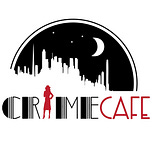

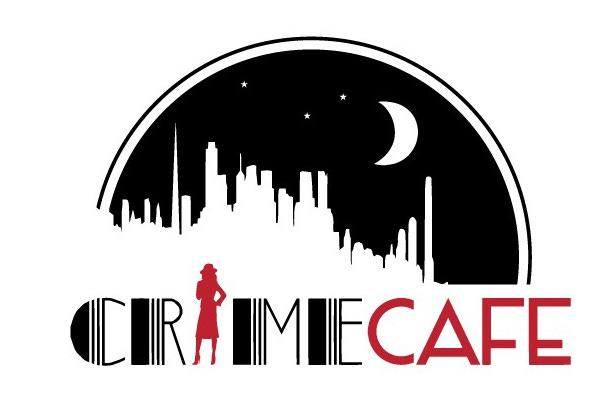
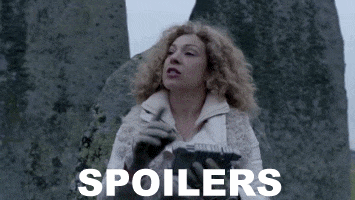
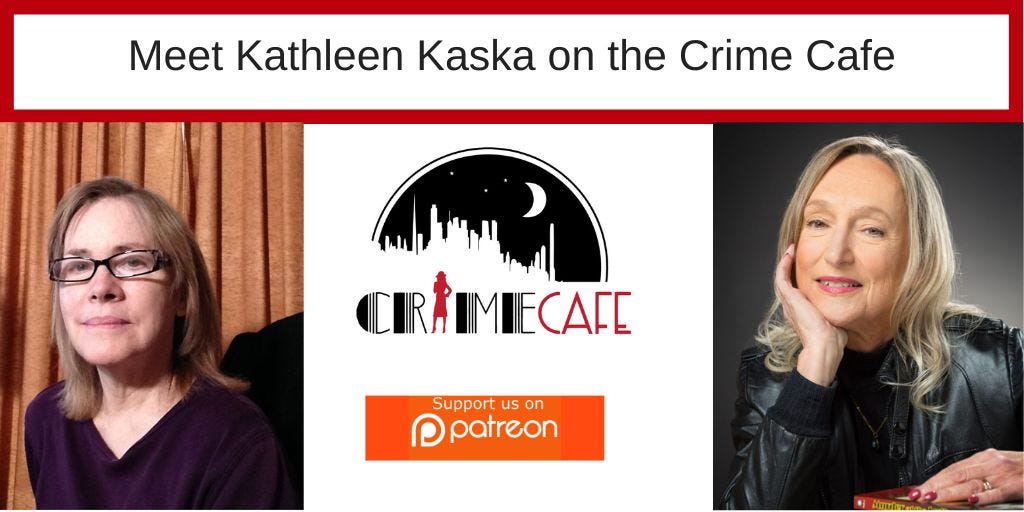





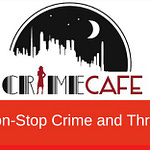
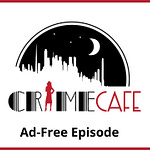
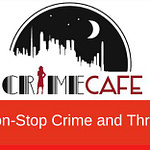


Share this post